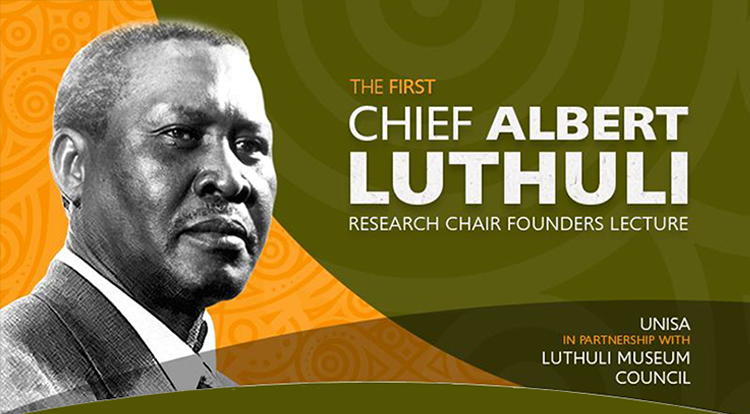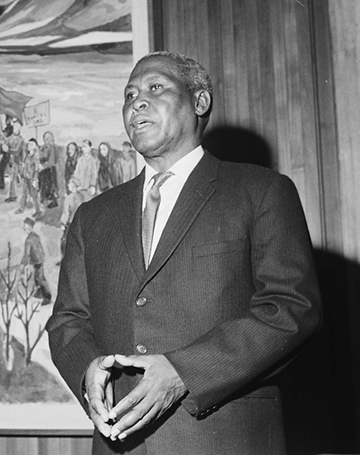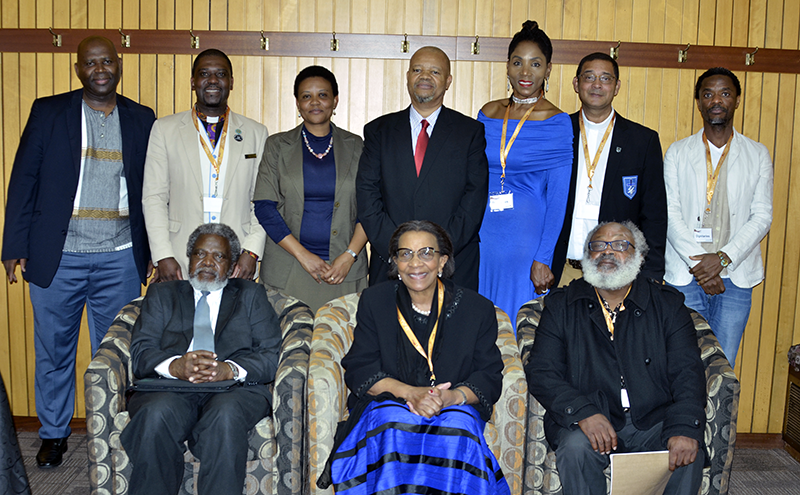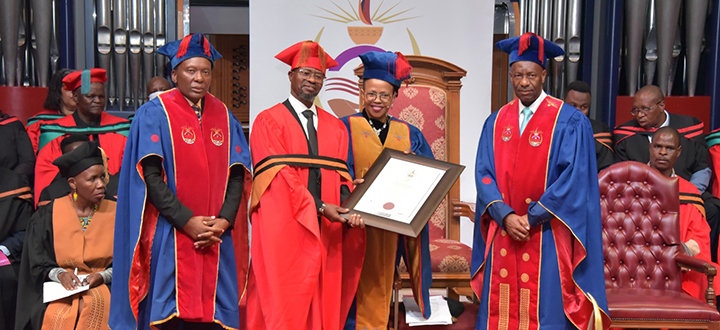News & Media
Leading through the most difficult times

Unisa and the Luthuli Museum hosted the Chief Albert Luthuli Research Chair Founders Lecture on 11 April 2019.

Luthuli joined the African National Congress (ANC) in 1944 and was elected onto the executive committee of the Natal branch in 1945.
In 1951, his position as president of the ANC Natal branch put him on a path of conflict with his government-sanctioned role as a chief. His public support for the Defiance Campaign of 1952, a non-violent protest against the repressive pass laws, was a prime example of this. He was later deposed as chief and issued a public statement called “the Road to Freedom is via the Cross” to the press.
In 1961, for his outstanding efforts to secure political freedom in apartheid South Africa, Luthuli received the 1960 Nobel Peace Prize for Peace. Facing mounting pressure nationally and internationally, the South African government permitted him to travel to Norway to receive his award.
A year later he was not allowed to travel to the United Kingdom, when he was appointed honorary rector of the University of Glasgow in 1962. In the same year, his autobiography Let my people go, was published.
Luthuli led the ANC until 21 July 1967, when, while out on a walk near his home, he was reportedly struck by a train and killed. At the time of his death, he was still under a restriction order. His life, work, and philosophy remain an enduring legacy to South Africa and the world.
Information sourced from luthulimuseum.org.za/luthuli-life-biography/
The lecture, entitled Albert Luthuli Research Chair at the University of South Africa: Social memory, politics, ethics, language, culture, knowledge, and artificial intelligence in the fourth industrial revolution, was delivered by Professor Muxe Nkondo, a member of the Unisa Council.
In his welcome address, Professor Mandla Makhanya, Principal and Vice-Chancellor of Unisa, said, “It was Chief Luthuli who took the baton to lead the ANC through turbulent times. It was during his presidency that the ANC’s Defiance Campaign adopted a more radical posture. It was during his presidency that the ANC and the entire Congress Movement finally adopted the armed struggle.”
He said that the stakes were high for Chief Luthuli at the time that he took over the presidency of the ANC. “In a sign of resoluteness in the face of repression, he issued a statement launching the Defiance Campaign in Natal on 30 August 1952. That was only seventeen days after the regime had arrested twenty leaders for promoting the campaign. They were charged under the Suppression of Communism Act,” narrated Makhanya.
Luthuli’s values
Member of the Unisa Council, Professor Muxe Nkondo, addressed the lecture radically. “Luthuli was one of a kind, it was between the meals and the chit chats with his children that you really understood his politics. He was involved in daily encounter with real people and real issues.” Nkondo argued that it is only through daily interactions and real encounters with people around us that we can truly understand what the real issues are, and it is only when we understand what the issues are that we can find real solutions.
“It does not matter how much scholarship or knowledge you command; it’s about how much you know and interact with those around you that really counts and makes us better people. It’s whether we know and perform our moral obligations and responsibilities; it’s about the difference we make in the lives of those around us. All these are values that Luthuli embodied,” argued Nkondo.
Move away from classifying ourselves
“Luthuli challenges us to loosen categorical thinking and behaviour. He challenges us to move away from classifying ourselves, black, white, Asian, male, female, and so on. Let us instead treat each other with reverence. Luthuli was a people’s person, a leader who looked beyond himself, always in touch with the real issues and challenges of people around him. It is these principles that we should strive to abide by,” asserted Nkondo.
“Even under banning orders, Luthuli continued to serve as a uniting force for the ANC until his tragic death. The major lesson learnt here, and one that is sorely needed today, is how one can lead an organisation through the most difficult times,” Makhanya said in his ending.
Also attending the lecture were the Luthuli family, the Chairperson of the Luthuli Museum Council, and religious representatives. Seasoned journalist Vuyo Mvoko facilitated the event and kept delegates in chuckles.
Responding to the keynote address by Nkondo was a panel that included Chairperson of Thabo Mbeki Foundation Dr Brigalia Bam; Public Service Commissioner (KZN) Dr Mpilo Pearl Sithole; and Advisor to the Unisa Principal and Vice-Chancellor and Director of VC projects Dr Somadoda Fikeni; Unisa Information Science Lecturer Bongekile Ncala; and Xubera Institute for Research and Development Senior Researcher Xolani Dube.
You can watch the full lecture here. There is a photo album of the event on Facebook.

Seated, Prof. Muxe Nkondo (Unisa Council), Dr Brigalia Bam (Chairperson: Thabo Mbeki Foundation), and Important Mkhize (Chairperson: Luthuli Museum Council), and, standing, Dr Somadoda Fikeni (Director: VC Projects and Advisor to the Principal), Rev. Thulani Ndlazi (United Congregational Church of Southern Africa), Dr Pearl Sithole (Public Service Commissioner, KZN), Prof. Mandla Makhanya (Principal and VC), Bongekile Ncala (Information Science Lecturer, Unisa), Rev Desmond Hess (United Congregational Church of Southern Africa), and Xolani Dube (Senior Researcher, Xubera Institute for Research and Development)
*By Tshimangadzo Mphaphuli
Senior Journalist
Department of Institutional Advancement
Publish date: 2019-04-24 00:00:00.0

 Young Unisa doctoral graduate joins elite Lindau Nobel Laureate group
Young Unisa doctoral graduate joins elite Lindau Nobel Laureate group
 Education MEC addresses Unisa autism seminar
Education MEC addresses Unisa autism seminar
 Seven Unisans nominated for the NSTF-South32 Awards 2023/2024
Seven Unisans nominated for the NSTF-South32 Awards 2023/2024
 Unisa awards posthumous honorary doctorate to literary maven, OK Matsepe
Unisa awards posthumous honorary doctorate to literary maven, OK Matsepe
 From humble beginnings to academic leadership
From humble beginnings to academic leadership